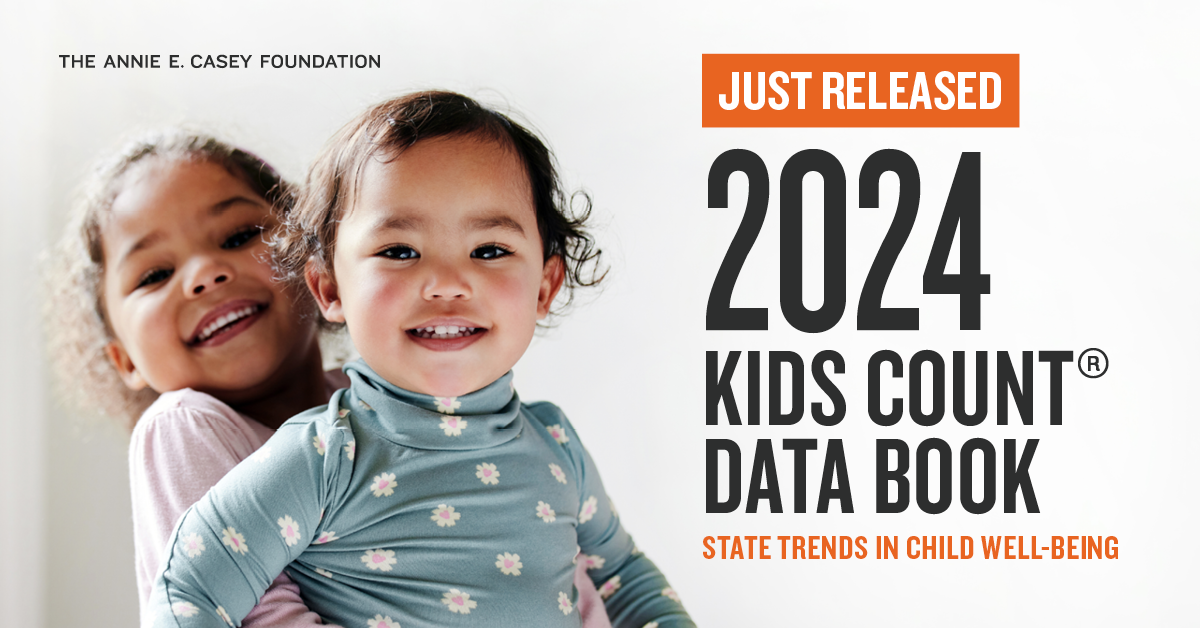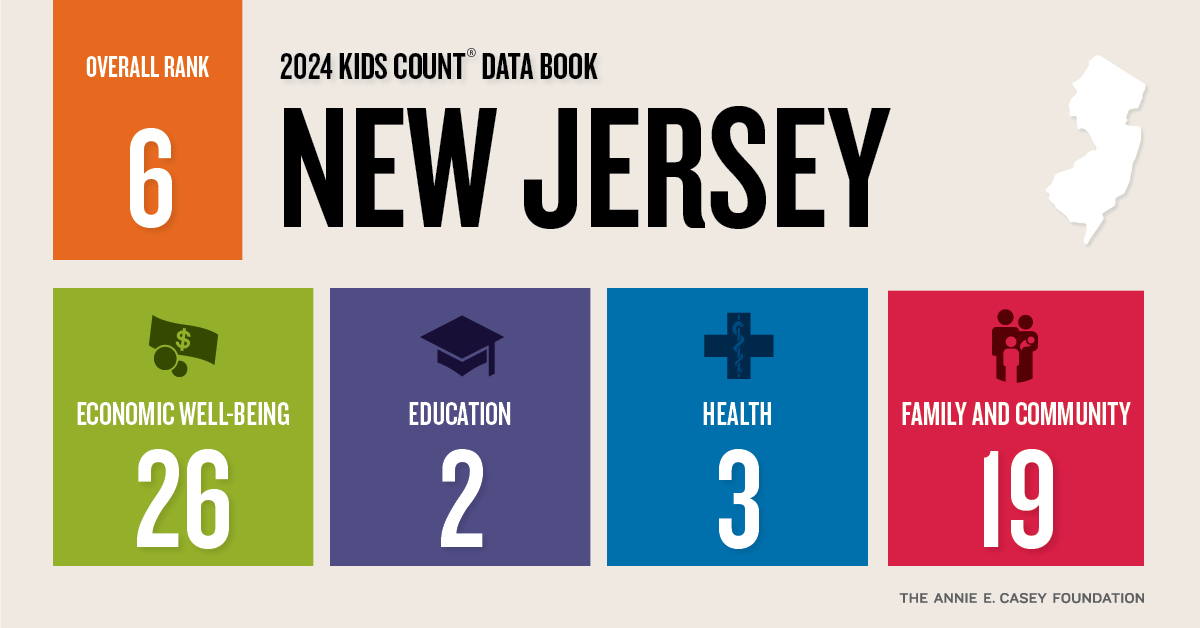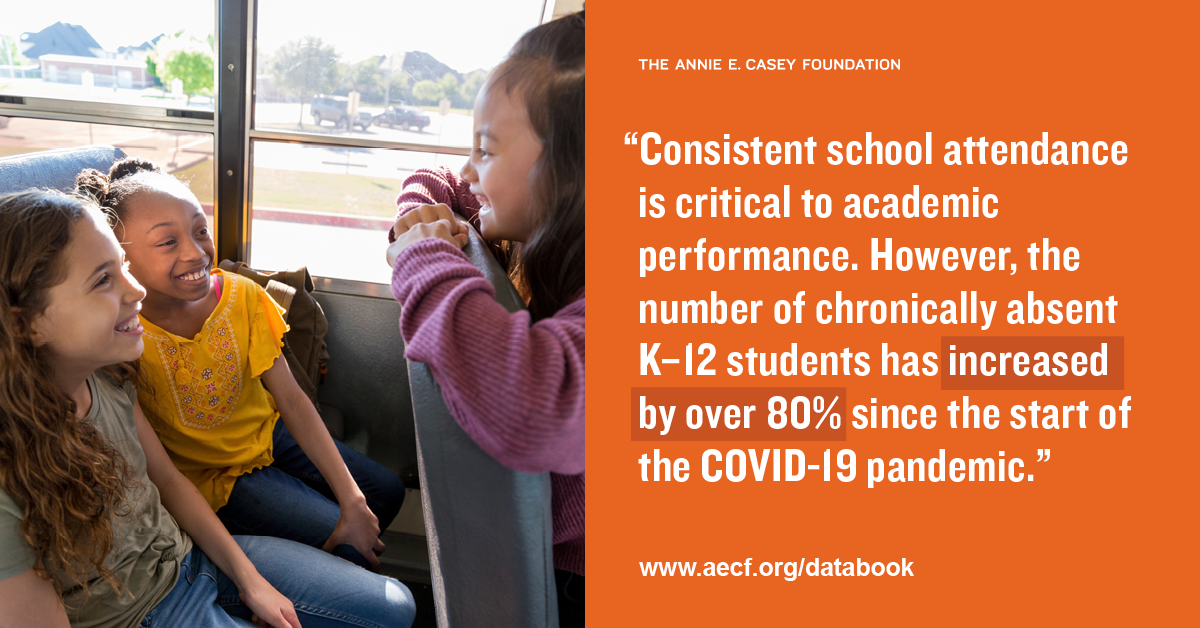Posted on June 10, 2024
New Jersey Ranks 6th in the 2024 KIDS COUNT Data Book as Advocates for Children of New Jersey Urges Focus on Equipping Kids to Learn and Addressing Economic Insecurity
50-State Data Show Poor Academic Outcomes, Too Many Children Living in Households Spending More Than Their Fair Share in Housing; Policymakers Must Act to Promote Kids' Future Success, Annie E. Casey Foundation Finds
NEWARK, NJ — New Jersey ranked sixth in the 2024 KIDS COUNT® Data Book, according to a 50-state report of recent data developed by the Annie E. Casey Foundation analyzing how kids are faring in post-pandemic America. Despite ranking second in education, a closer look at the data shows New Jersey leaders must do more to prepare children to learn so they are ready to earn when they reach adulthood. At stake nationally: hundreds of billions of dollars in future earnings and trillions of dollars in lost economic activity.
- An astounding 62% of New Jersey’s 4th graders scored below proficient in reading and 67% of New Jersey’s 8th graders scored below proficient in math levels in the 2022 National Assessment for Educational Progress
- The Garden State ranks second in the nation for its lowest student chronic absenteeism rate at 17%, following Idaho at 4%.
- New Jersey families continue to face economic insecurity, ranking 26th in Economic Well-Being after ranking 29th last year. More than one-third (35%) of children live in households spending more than their fair share on housing costs.
“Third grade marks a pivotal year when students begin reading to learn, rather than learning to read. We know that a strong early care and education system can make a difference in giving our children the educational foundation they need to be successful in kindergarten and beyond. New Jersey’s preschool expansion efforts are exemplary. However, to ensure it is continued, partnerships between school districts and community child care centers in expanding preschool must also be strengthened,” said Mary Coogan, president/CEO of Advocates for Children of New Jersey, the state KIDS COUNT grantee. “It is also necessary to ensure families have access to supports and services they want to help their children thrive.”
Key findings from the most recent school year available (2021-2022) show that a third of New Jersey students experienced one or more adverse childhood experiences (ACES). Moreover, state averages mask disparities that affect students of color, kids in immigrant families and children from low-income families or attending low-income schools.
In its 35th year of publication, the KIDS COUNT® Data Book focuses on students’ lack of basic reading and math skills, a problem decades in the making but brought to light by the focus on learning loss during the COVID-19 pandemic. Unprecedented drops in learning from 2019 to 2022 amounted to decades of lost progress. Chronic absence has soared, with children living in poverty especially unable to resume their school day routines on a regular basis.
Each year, the Data Book presents national and state data from 16 indicators in four domains — economic well-being, education, health, and family and community factors — and ranks the states according to how children are faring overall.
The Casey Foundation report contends that the pandemic is not the sole cause of lower test scores: Educators, researchers, policymakers and employers who track students’ academic readiness have been ringing alarm bells for a long time. U.S. scores in reading and math have barely budged in decades. Compared to peer nations, the United States is not equipping its children with the high-level reading, math and digital problem-solving skills needed for many of today’s fastest-growing occupations in a highly competitive global economy.
According to the report, this lack of readiness will result in major harm to the nation’s economy and to our youth as they join the workforce. Up to $31 trillion in U.S. economic activity hinges on helping young people overcome learning loss caused by the pandemic. Students who don’t advance beyond lower levels of math are more likely to be unemployed after high school. One analysis calculates the drop in math scores between 2019 and 2022 will reduce lifetime earnings by 1.6% for 48 million pandemic-era students, for a total of $900 billion in lost income.
However, some states have delayed spending their share of the $190 billion critical federal pandemic funding (Elementary and Secondary School Emergency Relief, or ESSER) that could help boost achievement.
According to FutureEd, for New Jersey, 26% of the third and largest round of funding, ESSER III, remained unspent as of March 31, 2024. The deadline to allocate – not spend – this funding is September 30, 2024. Tens of billions of dollars set aside for schools will vanish forever if states do not act immediately.
The Foundation recommends the following:
- To get kids back on track, we must make sure they arrive at the classroom ready to learn by ensuring access to low- or no-cost meals, a reliable internet connection, a place to study and time with friends, teachers and counselors. This year, Governor Phil Murphy expanded access to free school meals to more than 50,000 additional New Jersey students. The “Working Class Families Anti-Hunger Act” extends eligibility to families earning up to $67,200 a year, or 224% of the federal poverty level.
- Expand access to intensive tutoring for students who are behind in their classes and missing academic milestones. Research has shown the most effective tutoring is in person, high dosage and tied directly to the school.
- States should take advantage of all their allocated pandemic relief funding to prioritize the social, emotional, academic and physical well-being of students. As long as funds are obligated by the Sept. 30 deadline, states should have two more full years to spend them.
- States and school systems should address chronic absence, so more students return to learn. Although New Jersey is among one of the few states that gather and report chronic absence data by grade, all of them should. ACNJ helped spearhead the 2018 legislation that required every district with a chronic absenteeism rate of 10% or higher to develop a corrective action plan to improve attendance. Tracking attendance data will inform future decision-making. Lawmakers should embrace positive approaches rather than criminalizing students or parents due to attendance challenges, because they may not understand the consequences of even a few days missed.
- Policymakers should invest in community schools, public schools that provide wraparound support to kids and families. Natural homes for tutoring, mental health support, nutritional aid and other services, community schools use innovative and creative programs to support young learners and encourage parent engagement, which leads to better outcomes for kids.
###
RELEASE INFORMATION
The 2024 KIDS COUNT® Data Book will be available at www.aecf.org. Additional information is available at www.aecf.org/databook. Journalists interested in creating maps, graphs and rankings in stories about the Data Book can use the KIDS COUNT Data Center at datacenter.aecf.org.
ABOUT ADVOCATES FOR CHILDREN OF NEW JERSEY
Advocates for Children of New Jersey is the trusted, independent voice putting children’s needs first for 45 years. Our work results in better laws and policies, more effective funding and stronger services for children and families. And it means that more children are given the chance to grow up safe, healthy, and educated. For more information, visit www.acnj.org.
ABOUT THE ANNIE E. CASEY FOUNDATION
The Annie E. Casey Foundation creates a brighter future for the nation’s young people by developing solutions to strengthen families, build paths to economic opportunity and transform struggling communities into safer and healthier places to live, work and grow. For more information, visit www.aecf.org. KIDS COUNT® is a registered trademark of the Annie E. Casey Foundation.




